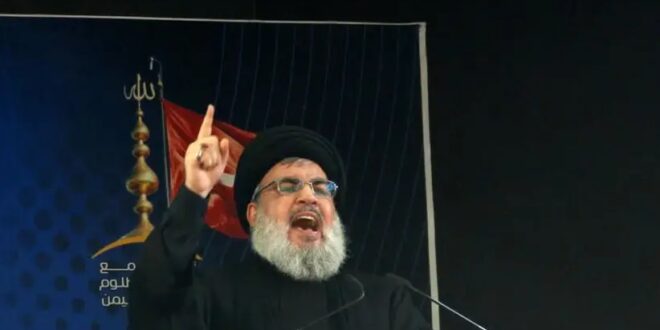Nasrallah stated that Hezbollah is in contact with “anyone who is willing to be part of this regional equation,” with Yemen’s Houthis being the first.
Hezbollah Secretary-General Hassan Nasrallah warned that the terrorist organization is working to reach a new equation in which any attack on Jerusalem will lead to a regional war, during his second speech in two weeks on Tuesday.
Nasrallah stated that Hezbollah is in contact with “anyone who is willing to be part of this regional equation,” adding that Yemen was the first result of these efforts after the Houthi terrorist group announced that they would act for “the protection of Jerusalem.”
The Hezbollah leader warned on Tuesday that Prime Minister Benjamin Netanyahu may resort to “reckless options,” such as actions in Jerusalem or going after Iran’s nuclear program, due to the formation of the anti-Netanyahu unity government in Israel, adding that “this matter must be followed.”
Nasrallah compared Netanyahu to former US president Donald Trump, referring to statements Netanyahu and Likud officials made calling the new coalition the “greatest fraud in history” and warning that the prime minister would do “anything” to stay in power.
Nasrallah made similar warnings of a “regional war” in his speech two weeks ago, stating that “any violation of Jerusalem won’t stop with Gazan” terrorist groups. In that speech, Nasrallah appeared extremely ill, with reports circulating that he was suffering from COVID-19 and in serious condition. At the time, the IDF stated that it believed that the speech was a mistake by Hezbollah, as Nasrallah was attempting to broadcast threatening messages, but looked weak and sick.
Hezbollah denied these reports over recent weeks and in his latest speech, Nasrallah appeared more healthy and spoke without a raspy voice or coughing.
Concerning internal matters in Lebanon, Nasrallah spoke out against early parliamentary elections on Tuesday and stressed that the parties should work to form a government instead, amid continuing political instability in the country.
Nasrallah claimed that accusations that Hezbollah is behind the crisis in Lebanon were just ignoring the “real causes” and were coming from America and Israel.
The Hezbollah leader stressed that the gasoline crisis in Lebanon could be addressed within a few days if the country would just accept Iranian oil shipments, which are under sanctions by international law.
“All the humiliation that the Lebanese people suffer in front of gas stations will end quickly when the decision is made to abandon America and import oil from Iran in Lebanese pounds,” said Nasrallah. The Hezbollah leader stated that Hezbollah will eventually negotiate directly with the Iranian government on its own and import Iranian oil through the Port of Beirut, if the Lebanese government does not begin “bearing its responsibility.”
Such a move could bring Iranian fuel tankers not far from Israel’s shores. Earlier this year, a number of Iranian ships were hit by attacks blamed on Israel, with a number of Israeli ships hit by alleged Iranian attacks as well. The Wall Street Journal reported earlier this year that a dozen Iranian oil tankers headed to Syria had been attacked by Israel.
As Nasrallah spoke, Israel’s Security Cabinet met to discuss efforts by right-wing groups to carry out a flag march through Jerusalem’s Old City, including the Muslim Quarter.
While Israel Police have already informed the event organizers that the event was not approved and would be canceled, Netanyahu has pushed for further discussions on the matter, leading to the Security Cabinet meeting on Tuesday.
Officials have expressed concerns that such a march could re-spark violence in the West Bank and with Gaza.
Hamas leader in Gaza Yahya Sinwar warned on Saturday that the coming days would be “a test” to see if agreements surrounding a ceasefire which ended Operation Guardian of the Walls would be held up by all sides, stating that “if the battle with the occupation returns, the shape of the Middle East will change.”
Hamas’s spokesperson in Jerusalem warned on Saturday against the march, calling on Palestinians to arrive at al-Aqsa on Thursday to confront the march. Jews are, in general, allowed to visit the Temple Mount during specific visiting hours on Thursdays and all other days of the week except for Friday and Saturday, although police could ban Jewish visitors if they believe that it is not safe or that it could harm security.
Operation Guardian of the Walls, which ended a few weeks ago after a ceasefire was reached between Hamas and Israel, was sparked amid heightened tensions surrounding discussions over potential evictions in the Sheikh Jarrah neighborhood of Jerusalem and clashes on the Temple Mount.
During the operation, Nasrallah did not make any statements, and Hezbollah officials remained relatively quiet, with only one or two statements made besides from an official statement issued by the terrorist movement after the ceasefire.
 Eurasia Press & News
Eurasia Press & News


